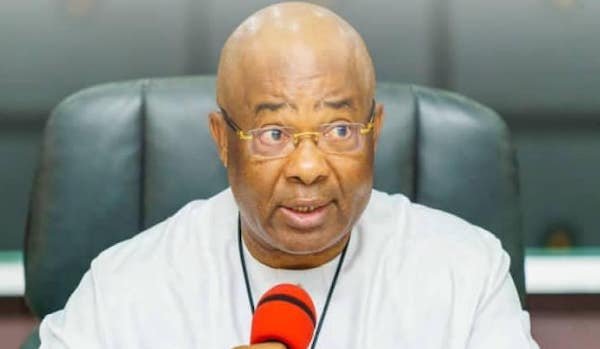In a bustling campaign rally, Governor Hope Uzodinma of Imo State raised hopes and dreams to soaring heights. The air was thick with anticipation as he addressed a jubilant crowd of mostly young Imo residents, who had gathered to hear his campaign promises. The governor’s words echoed through the hearts of those in attendance, promising a brighter future and opportunities beyond the borders of Nigeria.
Uzodinma’s bold proclamation was nothing short of audacity as he pledged to assist no fewer than 4,000 interested indigenes of Imo State in relocating to Europe and Canada by the end of December to take up jobs. The crowd erupted into euphoria, their excitement palpable, as the governor painted a picture of a life filled with promise and prosperity in foreign lands.
Join our WhatsApp ChannelREAD ALSO: We’ll Use Tech To Fight Insecurity In Southeast – Uzodinma
“Let me tell you something: I have gone further to negotiate with the European Union companies and the Canadian companies,” Governor Uzodinma said. “They are sending us areas of visible skills which our youth will also learn. By December this year, 4,000 Imo youths will be employed in Europe. Once that letter comes, the governor will pay for your air ticket.”
But as the news of this promise reverberated far and wide, it didn’t take long for criticism to follow. Social media platforms, including X (formerly known as Twitter), were ablaze with condemnation, branding Uzodinma’s words as a desperate ploy to cling to power. This ignited a conversation that questioned the ethical and practical implications of such grandiose promises from political leaders. Some wondered why the governor who should be the one promoting policies and actions that would stimulate job creation to boost the state’s economy is now encouraging human capital flight. Others said they took it with a pinch of salt, describing it as one of those empty campaign promises that politicians make at rallies prior to elections simply to deceive the people and get their support and later fail to fulfill them.
Reacting to that, Dr. Jonathan, an economic expert from the Department of Economics, University of Nigeria Nsukka (UNN), expressed concerns about the implications of such comments. He said: “You see, our political leaders need to be measured in their engagements with the public. Everything should not be about politics or the quest to grab power at all costs. Sometimes, our leaders should put the interest of our country first.”
The governor’s promise to facilitate the relocation of thousands of Imo youths to Europe and Canada raised several eyebrows. Dr. Jonathan asked: “Is he now marketing the European economies against his own country? Or, is he now encouraging the youths to embrace the ‘japa’ syndrome as a campaign promise?”
Dr. Jonathan’s questions point to a broader issue at play here- the responsibility of political leaders to prioritize their country’s interests above all else. It is undeniable that addressing unemployment and creating economic opportunities for the youth are critical tasks for any government. However, the governor’s approach to this challenge has ignited a debate about the ethics and feasibility of such promises.
Governor Uzodinma’s extravagant promise raises several concerns. Firstly, it begs the question of whether such a promise is a practical and sustainable solution to unemployment in Imo State. Relocating thousands of youths to foreign countries is a complex endeavor that involves a multitude of logistical, legal, and economic challenges. Can the governor deliver on such a pledge, or is it merely a campaign gimmick designed to win votes?
Furthermore, there is a concern about the message this promise sends to the youth of Imo State. Encouraging young people to leave their homeland in pursuit of better opportunities abroad may inadvertently promote a “brain drain” and discourage them from investing in the development of their own state and country. Instead of seeking employment opportunities overseas, should the focus not be on creating an environment in Imo State that nurtures entrepreneurship and economic growth?
Dr. Jonathan’s critique of Governor Uzodinma’s promises highlights the need for political leaders to focus on their performance in office and tangible achievements when seeking re-election. He pointed out that the governor should be showcasing his report card, detailing how he has improved Imo State’s infrastructure, security, and overall welfare of its citizens. Indeed, the primary purpose of government at all levels is to ensure the security and welfare of the people.
Analysts aver that rather than making unrealistic and potentially misleading promises of job opportunities in Europe, the governor should concentrate on marketing his own state and addressing the pressing challenges faced by Imo residents; he should outline his concrete plans for job creation within the state and how he intends to make the state more attractive to investors. This approach, they believe, would not only be more grounded in reality but also more in line with the fundamental responsibilities of a state leader.
In addition to the ethical considerations, there are also practical questions surrounding Governor Uzodinma’s promise. Negotiating with European and Canadian companies to secure employment for 4,000 individuals is a complex and lengthy process. Even if such agreements were reached, there is no guarantee that the promised jobs would materialize within the specified timeframe.
Moreover, the logistics of facilitating the relocation of thousands of people, including covering the costs of air tickets, is a monumental task that raises financial and administrative challenges. Can the state government handle such an operation efficiently? And what impact would this have on the state’s finances, especially in a time when many governments are grappling with economic uncertainties?
Governor Hope Uzodinma’s promise to assist 4,000 Imo youths in relocating to Europe and Canada before the end of the year has sparked a contentious debate about the role and responsibilities of political leaders. While the desire to address unemployment and create opportunities for the youth is commendable, the approach taken by the governor raises ethical, practical, and economic questions.
Political leaders must prioritize the interests of their country and state while seeking re-election, focusing on tangible achievements and concrete plans for development.
Promises that seem extravagant and disconnected from the realities on the ground of risk undermining trust in the political process and ultimately harming the very people they aim to help. In the end, it is the responsibility of leaders to lead with integrity and ensure that their actions align with the best interests of their constituents and their nation as a whole.
Emmanuel Ochayi is a journalist. He is a graduate of the University of Lagos, School of first choice and the nations pride. Emmanuel is keen on exploring writing angles in different areas, including Business, climate change, politics, Education, and others.


















Follow Us